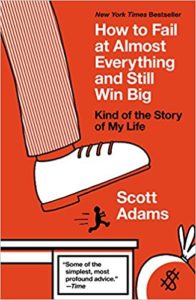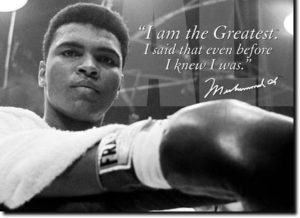 Affirmations are a powerful way for you, as an athlete, to overcome ways of thinking that are holding you back from becoming your best. Society has programmed many “limiting beliefs” into your mind over your lifetime. If you have read my post about Mental Management, you will notice that affirmations are one way that you can use your Conscious Mind to program your Subconscious Mind and improve your Self Image.
Affirmations are a powerful way for you, as an athlete, to overcome ways of thinking that are holding you back from becoming your best. Society has programmed many “limiting beliefs” into your mind over your lifetime. If you have read my post about Mental Management, you will notice that affirmations are one way that you can use your Conscious Mind to program your Subconscious Mind and improve your Self Image.
You will also find that doing affirmations on a regular basis will improve your focus on positive outcomes or goals while pushing out thoughts about the obstacles / limiting factors / fear of the unknown you might be experiencing.
This article will define affirmations, show you how to build effective ones as well as provide some samples that you can use or adapt to your own situation.
What are affirmations?
Affirmations are statements that you write down and say on a regular basis, ideally every day, multiple times a day. Repetition is key. The more often you say the affirmation, the more likely it is to come true.
 Don’t believe me?
Don’t believe me?
It is good to be skeptical, especially when we are talking about changing how your brain is programmed. On the other hand, if there is something that will make your life better, don’t you deserve to learn about it? Here is the link to an article by the creator of the comic strip Dilbert, Scott Adams, that talks about why he thinks affirmations work. He also talks extensively about his experiences using affirmations in his book, “How to fail at almost everything and still win big“. Let’s assume that between what Coach Wheeler and Scott Adams have said, you want to learn more about how to use affirmations to improve your life.
How do I create effective affirmations?
The key to making affirmations that work is three-fold…
(1) Affirmations must be in the present tense. They might start with “I am…” They are built on the assumption that the goal or state of being that you desire is already happening. This is important since your mind will begin to believe whatever you say, especially if it is repeated enough. I am sure you have seen this happen to someone, maybe even yourself, where sticking to their story for so long that you believe it is true. Even if the person is delusional (i.e. disconnected from reality), their decision making is based on the “future reality” that they desire and believe. Because of this, their actions fall in line with that reality. The result? You create the reality that you believe.
(2) Don’t use negatives. Replace negative statements with something positive that overcomes the negative. For example, if you want to reduce the number of turnovers you commit in games, don’t use “I won’t turn over the ball.” Instead, focus on the positive condition that removes the negative, such as “I am an excellent passer.”
 (3) True or Not? A successful affirmation should represent what you want to be true, not necessarily what is already true. Some people have trouble imagining a different life where they enjoy an upgraded existence, especially if they are in the middle of some sort of crisis. When things are not going your way, that is exactly when you need to develop a vision for a better tomorrow. The easiest way to make that “better tomorrow” happen is to imagine how it will feel and consistently program your mind to believe it will happen. Affirmations are the perfect tool to use the power of words to start thinking differently about your situation. Once you think different, you will act different and things will change.
(3) True or Not? A successful affirmation should represent what you want to be true, not necessarily what is already true. Some people have trouble imagining a different life where they enjoy an upgraded existence, especially if they are in the middle of some sort of crisis. When things are not going your way, that is exactly when you need to develop a vision for a better tomorrow. The easiest way to make that “better tomorrow” happen is to imagine how it will feel and consistently program your mind to believe it will happen. Affirmations are the perfect tool to use the power of words to start thinking differently about your situation. Once you think different, you will act different and things will change.
Sample Affirmations for Athletes:
Below are some examples that you can use or adapt to fit your own situation. These sample affirmations are geared toward somethings that athletes may find helpful. If you have additional ideas, please be sure to leave a comment below!
- I make every open shot.
- I control the game.
- I make my team mates better.
- I deliver the ball so my team mates can easily score.
- I am in amazing shape and better conditioned than my competitors.
- I am mentally tough. Nothing can stop me from achieving my goals.
- I am a winner.
- I constantly learn, grow and improve my game.
- I perform well under pressure.
- I am a good team mate.
- I work hard and produce results. *
- I can be trusted and never let down my team. *
* These last couple affirmations are more “character-related” (versus skill-related or outcome-oriented). For a downloadable Character Assessment Worksheet based on the work by Brett Ledbetter from “What Drives Winning”, check out the link to this article. [link coming soon]
Bottom Line:
Warning… Don’t compare your affirmations with what other people are doing. Your affirmations are specifically for YOU and YOU can be great! Don’t let anyone tell you that your aspirations and goals are “unrealistic”. Greatness, by definition, requires you go beyond ordinary to achieve the “extraordinary” !
This is what will happen as you start doing affirmations. You will begin to notice when you are in situations like the ones in your affirmations. This recognition along with the memory of what you have stated in your affirmation will move you toward achieving your affirmation. Will it happen immediately? Not likely… but it could. You might realize that you were closer to your affirmation than you imagined. If not now, when? In other words, how sure are you that it will it happen eventually? 100%. The sooner you start your affirmations, the sooner you will see results.
